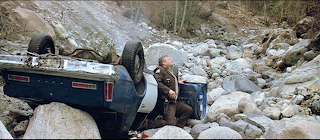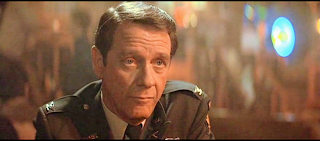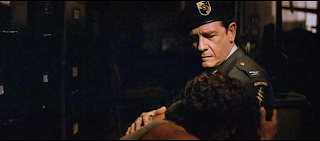First Blood sets up Sylvester Stallone's character as a Lone Wanderer — a hippie-type, nameless for the first 12 minutes, wearing an Army jacket and carrying a bedroll. He strides into an Edenic setting, surveys it . . .
. . . and smiles.
It ain't much, and it's the only smile we get for the entire movie.
He approaches a black woman, hanging laundry on a line. She appears
to be barely submerging her hostility. He notes her surliness, but
cheerfully presses on, showing her a picture of the man he is looking
for, an old army buddy from 'Nam. She informs him that his friend has
died, of cancer — from Agent Orange. This woman has just said the
most lines a woman will deliver in this movie. She offers him neither
solace nor hospitality.
The Wanderer's smile disappears. He apologizes, gives her the
picture, and discards a small address book as he leaves Eden and
returns to the road.
Now the sky clouds over, and the temperature drops. After walking
undisclosed miles, Our Hero approaches a town: the ironically-named
Hope.
Here our next Protagonist steps out, surveys, and smiles: Sheriff
Teasle (Brian Dennehy).
He
likes what he sees. Hope isn't perfect — he asks one resident
old-timer, “Gonna take a bath this week?” (cleanliness is a big
deal for this Sheriff) — but it's perfect enough. He spots the Lone
Wanderer, decides he doesn't like what he sees, and ushers him out to
the far side of town, telling him to keep walking. The Lone Wanderer
turns around and walks back toward Hope. The situation deteriorates.
The
direction the script could take — the direction many subsequent
Stallone scripts have indeed taken — is to set Teasle as the
antagonist, and the Lone Wanderer as the protagonist. First
Blood takes
pains to keep that from happening, by introducing an unregenerate
antagonist and bully: Galt (the incomparable Jack Starrett).
 |
| Galt, left; David Caruso, dutiful son, centre. |
So far the Wanderer has been quietly undermining their assumed
authority. Like a mopey adolescent, he only does half of what they
tell him to do, testing their patience. Teasle stares incredulously
at the kid, trying to understand what the hell is wrong with him.
Galt just wants to beat him up, but he is held in check, somewhat, by
Teasle.
 |
| Dutiful son #2, left. |
The situation escalates. Teasle pushes, Rambo passively resists. Then
Galt assaults, triggering the dark forces we know are pent-up in
Rambo. The Wanderer transforms into the Wild Child, and escapes.
Teasle takes off in pursuit. Out of town, in the mountains, Teasle's
car crashes . . .
. . . just as Rambo's motorcycle flips. If the two protagonists were
sane, they'd take a deep breath, extend a hand and say, “Can we
start from square one?” But by now we know they share the exact
same character flaw: each cannot abide the other's authority.
The kid scampers into the woods. The Father summons the Family, and
lumbers in after him.
It takes some time, and involves considerable peril — Galt, the
Nobodaddy, comes closest to destroying the Wild Son, and perishes in
the process1 — but Rambo endures and slowly turns the tables of
authority on the avenging Father. He spares Teasle, and advises him
to “Let it go,” words that, perversely enough, form an invitation
to the opposite effect.
Teasle does the expected, and summons the State Troopers to help him
in his quest. And thus we are introduced to the third and final
protagonist — the Mother Figure, Colonel Trautman.
Played with old-school cool by Richard Crenna, Trautman is a nearly
unreadable cipher. His terse utterances signify Military Swagger — “God
didn't make John Rambo: I did.” “You send that many men after
him, don't forget one thing: a good supply of body bags.” etc — and he
prowls around Teasle's camp of Weekend Warriors with a leonine
authority that Teasle simply cannot muster. But for all his clipped
verbal bravado, Crenna's Trautman in fact spends most of his
screen-time silently observing the proceedings.
Trautman clearly has rank and common-sense on his side. But where a
younger Trautman might bump chests with the blowhard Teasle and end
this circus before it gets worse, the older Trautman — invested
with Crenna's sorrowful, sagging hound-dog face — is the very
picture of matronly discretion and composure, frequently
communicating that most distant trait of masculinity: deep regret for
the road not taken.
As the Mother figure, Trautman understands that the Father and Son
share equal responsibility for this debacle. But as the Mother
figure, Trautman is also too deeply invested in the spiritual drama
to see a clear way through to salvation. Trautman's practical
solution — “Let him go. Issue an APB. In a month he'll get picked
up in Seattle, or some other city, and no-one will get hurt” — is
superficially spot-on. He knows that without the fight, the Son is
nothing — just another drifting loser. He also knows the same holds
true for the Father. The Mother intuitively knows there is no
“practical” road to wisdom for either of these loved ones,2 and
so does not press the point.
The
conversations between Teasle and Trautman are akin to the dialogues
of long-married couples who have settled on a script. (Think I'm
stretching credibility? Try this: go here, and read Trautman's lines
with Angie Dickinson in mind.) “She” proposes the practical
solution — ”Let
him go.” “Now why don't you forget what you're thinking and clear
out while you can?”
The Father jeers back at The Mother —
“And what would you do? Wrap your arms around him and give him a
big sloppy kiss?”
Confronted with this bluster, Trautman tellingly does not dismiss the
possibility out of hand, and instead (yet again) keeps his counsel.
Of course the Son is triumphant in the wild, and returns to Hope to
visit vengeance on the Father. The Father, defeated, eggs him on in
typical “masculine dis-associative” language: “Go ahead, you
crazy son of a bitch!” (You're your mother's fault.)
Rambo seems on the verge, but Trautman steps forward, interrupting
the patricide.
 |
| "It's over, Johnny!" |
Beneath the Maternal gaze, the Son's defences crumble.
He rages . . .
. . . then he sorrows . . .
. . . then he wilts.
It turns out that the Mother's embrace was exactly what the Son
required.
There are people who don't quite “get” that scene — Roger Ebert
was flummoxed by it. He thought the content of that final monologue
had been delivered with more force in movies like Coming Home.
This may be true — for a film critic. In his commentary for the
DVD, novelist David Morrell marvels at the bales of letters he's
received from Vietnam vets who said this was the first movie they
could take their wives to and say, “See, that's what I'm
trying to tell you!” I submit that the bizarre, and seemingly accidental, wisdom of this scene — in this movie — holds a primal
appeal to four types of movie goer: Active Personnel and the family members who love
them; adolescents, and the parents who love them. Ebert was none of these things when
he saw the film.
Rambo's monologue is a wildly audacious gamble,3 and Stallone
invests everything — every emotion, every instinct, every facet of
his intelligence as an actor — he has in it. If the scene doesn't
work for you, it's not because Stallone was holding back, or
keeping anything to himself. Ebert thought the movie in the woods was
the movie that should have survived. But take away the monologue, and
Stallone's invested delivery, and the movie comes apart at the seams.
Prior to First Blood there were glimmerings that Stallone
could sell as an action figure. Sadly, Ebert's kvetch (“Stick to
action, Sly”) proved to be the road taken for Stallone and his
handlers. The subsequent Rambo adventures lack all traces of the heart and
soul Stallone pulled out and threw on the table (Crenna's
performances also suffer, his jolliness for the regular paycheck too
obvious to conceal). Indeed, all Stallone's subsequent performances
have a searching quality to them, as if he might locate something of
whatever it was that made this movie and this role so very memorable, if only
he knew where to look.
So it goes. Hoping for another good Stallone action movie is
probably like hoping Brando would pull it together one last time for
a final bravura performance that actually meant something to the man
himself. It'll likely never happen. But there are still a few of us
hoping Stallone catches sight of his original brilliance, before the
final curtain drops and extinguishes it altogether.
1 Galt's is the only death in this movie, another anachronism for an
action flick (thoroughly “remedied” by the sequels).↩
2 Here I might be stretching the film to fit my reading of it: the
more credible reading is that Trautman sees in Teasle the younger,
bloodthirsty man that Trautman himself once was, back in 'Nam.↩
3 The only Hollywood movie I've seen take this level of risk since
then is P.T. Anderson's Magnolia.↩


















No comments:
Post a Comment